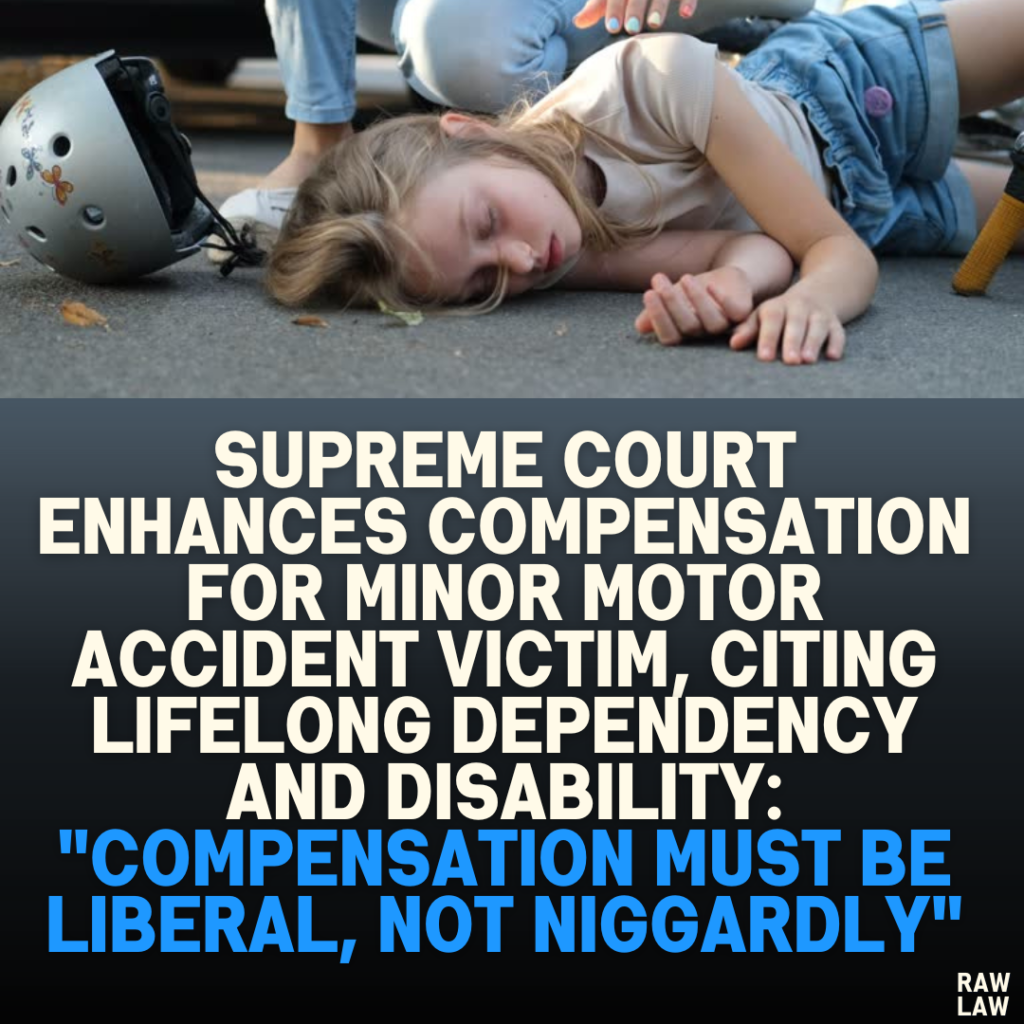Court’s Decision
The Supreme Court overturned the High Court of Delhi’s judgment in a motor accident claim, significantly enhancing the compensation for the minor victim from ₹11,51,000 to ₹50,87,000. The Court emphasized, “Compensation must be liberal, not niggardly, since the law values life and limb in a free country in generous scales.” The Court recalculated the compensation under various heads, reflecting the severe and lifelong impact of the appellant’s injuries.
Facts
- Incident:
- On June 2, 2009, the appellant, a seven-year-old girl, was crossing the road on a zebra crossing with her family in Delhi.
- A speeding car struck her, resulting in grievous injuries, including permanent brain damage and fractures.
- Consequences:
- The appellant was diagnosed with 75% disability due to moderate mental retardation, effectively rendering her dependent on a full-time caretaker for life.
- Her condition severely affected her mobility, cognition, and ability to control basic bodily functions.
- Legal Proceedings:
- The appellant initially filed a claim under Section 166 of the Motor Vehicles Act, 1988, before the MACT.
- MACT awarded ₹5,90,750 as compensation.
- Dissatisfied, the appellant approached the Delhi High Court, which enhanced the compensation to ₹11,51,000.
- Still dissatisfied, she filed an appeal with the Supreme Court.
Issues
- Was the compensation awarded by the Tribunal and the High Court adequate and just?
- What should be the quantum of compensation under different heads, including pain, suffering, loss of marriage prospects, and future medical expenses?
Petitioner’s Arguments
- The awarded compensation did not reflect the gravity of the appellant’s injuries and lifelong dependency.
- The High Court failed to account for the need for a full-time skilled attendant, increased costs of future medical care, and the severe impact on her quality of life.
- The appellant’s condition, including her inability to marry or engage in gainful employment, required a more liberal compensation.
Respondent’s Arguments
- The High Court had already been liberal by enhancing the compensation.
- There was potential for improvement in the appellant’s condition, making additional compensation unnecessary.
Analysis of the Law
The Supreme Court reviewed the principles of just compensation under the Motor Vehicles Act and referred to several precedents to guide its decision:
- Kajal v. Jagdish Chand: Stressed the importance of compensation reflecting the severe and lifelong impact of disabilities.
- Master Ayush v. Reliance General Insurance Co.: Highlighted the need for enhanced compensation for young accident victims who face lifelong dependency.
- National Insurance Co. v. Pranay Sethi: Provided guidelines for calculating future prospects and multipliers in compensation cases.
The Court emphasized that compensation must address both pecuniary (financial) and non-pecuniary (emotional and psychological) losses comprehensively.
Precedent Analysis
- Kajal v. Jagdish Chand: A 12-year-old accident victim’s compensation was enhanced considering her 100% disability and its lifelong impact. The Court emphasized the importance of addressing non-pecuniary damages such as pain and suffering.
- Master Ayush v. Reliance General Insurance Co.: A five-year-old paraplegic victim’s compensation was increased to account for lifelong dependency and diminished quality of life.
- National Insurance Co. v. Pranay Sethi: Provided a framework for calculating just compensation, emphasizing future prospects and inflation-adjusted calculations.
Court’s Reasoning
- Disability Consideration:
- The Court considered the appellant’s 75% disability as 100% for practical purposes, given her inability to live independently.
- It noted that the appellant would require constant supervision and medical care.
- Just Compensation:
- The Court emphasized that compensation must be calculated liberally to ensure that victims receive adequate financial support for their present and future needs.
- It corrected errors in the High Court’s calculations, particularly concerning attendant charges, loss of marriage prospects, and future medical expenses.
- Principles Applied:
- The Court applied multipliers and added future prospects to ensure that the compensation reflected real-world costs and inflation.
Conclusion
The Supreme Court revised the compensation under various heads as follows:
- Loss of Earning Capacity: ₹13,18,000
- Calculated based on the minimum wage of a skilled worker in Delhi and adjusted for future prospects with a multiplier of 18.
- Pain and Suffering: ₹15,00,000
- Reflecting the appellant’s lifelong mental and physical trauma.
- Attendant Charges: ₹9,42,000
- Adjusted for a full-time skilled attendant instead of a part-time unskilled worker.
- Future Medical Treatment: ₹5,00,000
- Accounting for lifelong medical expenses, including diapers and potential complications.
- Loss of Marriage Prospects: ₹5,00,000
- Recognizing the appellant’s inability to form a family due to her condition.
The total compensation awarded was ₹50,87,000. The Court also upheld the High Court’s 9% interest rate from the date of filing until realization.
Implications
This judgment reinforces the principle that compensation for motor accident victims must be liberal and reflective of their lifelong challenges. It sets a significant precedent for enhancing compensation in cases involving severe injuries and young victims. By applying practical disability assessments and addressing non-pecuniary damages, the Supreme Court ensured a comprehensive and humane approach to justice.
